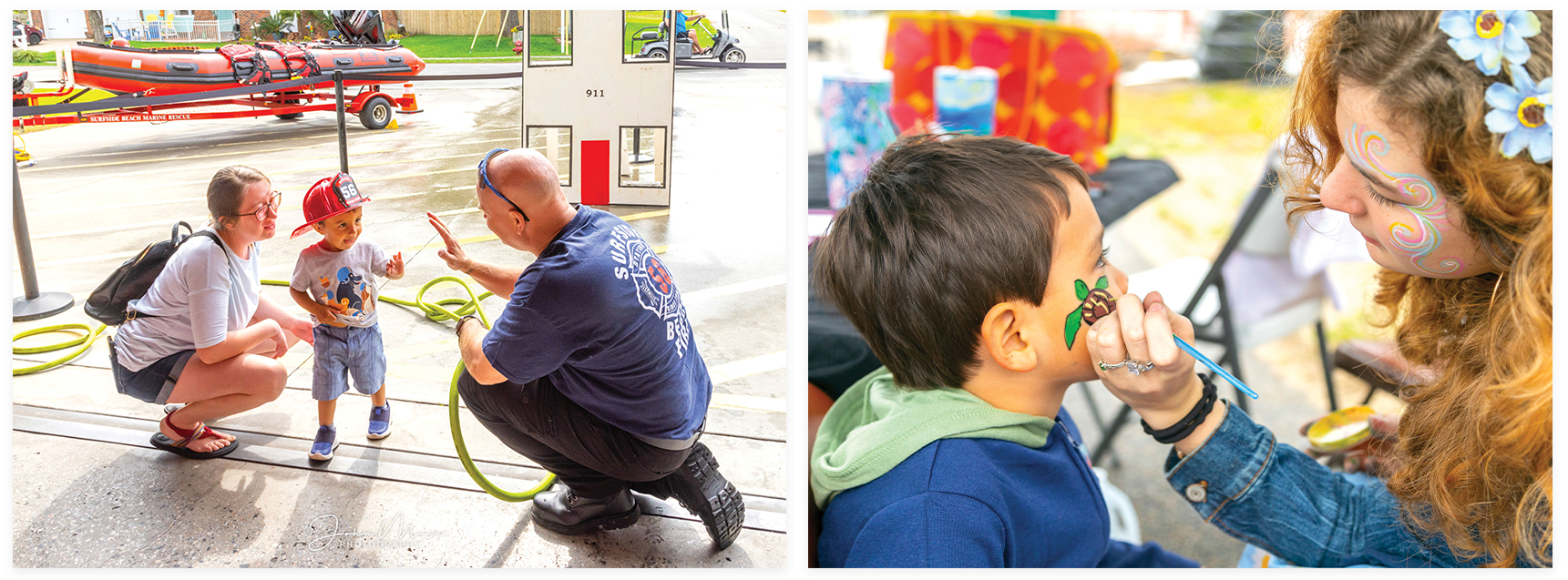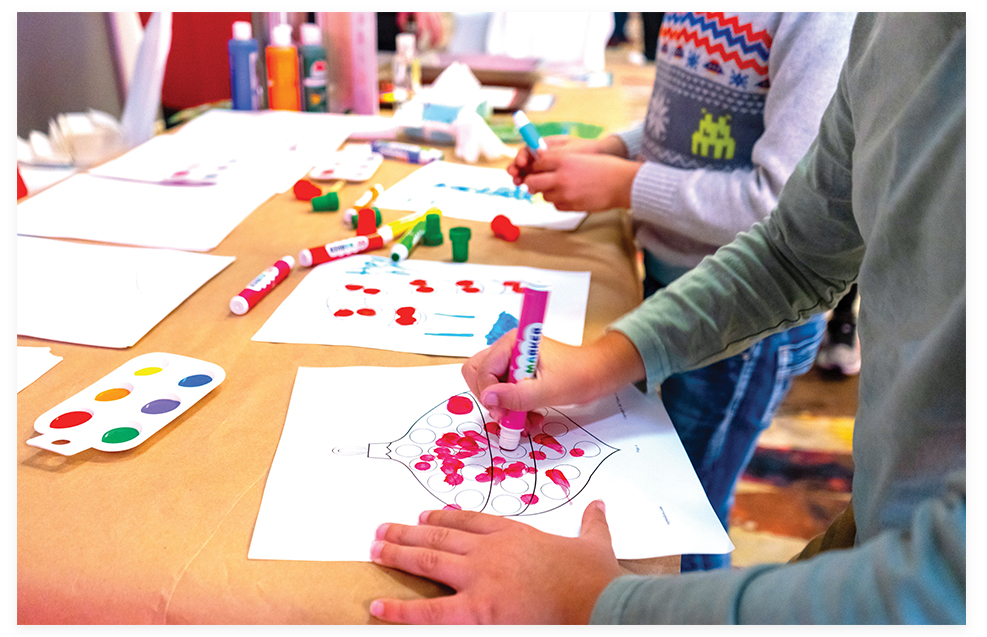The Champion Autism Network (CAN) Serves Autistic Kids and their Families

On a pleasant and warm sunny afternoon, I’m given a ride to lunch in “Chitty Chitty Bang Bang,” or “The CAN Mobile,” both names given to a golf cart owned by the nonprofit C.A.N. (Champion Autism Network.) A common site around Surfside Beach, the gas-powered machine putts around town between the CAN office on U.S. 17 Business, favorite lunch spots, or CAN founder Becky Large’s nearby home. Backfiring with a quiet little pop at every other stop sign, the larger than life Large smiles and finds humor and a sardonic wit help her get through the day as the mother of a high-functioning autistic young adult son, as wife to local attorney Michael Large, and in leading the charge to make life better for autistic families, first around the Grand Strand, but ultimately, she hopes, around the world.
CAN, a small non-profit with just two paid staffers and an army of volunteers, formed seven years ago as Large transitioned from a life in corporate sales in Philadelphia, to her changing roles and understanding of just what it means to have an autistic family member. The non-profit helps facilitate a number of sensory-friendly activities such as a free monthly movie event at the Grand 14 Market Common theater, where the lights are up, the sound is down, and every CAN family member is free to roam around the theater. Sensory-friendly bowling, Big Air trampolines, a family fun day at the Myrtle Beach State Park, and other sensory-friendly events are also tailored to those with the disability. A new program, and separate corporation, the Autism Travel Club is an app for any smartphone that alerts caregivers and family members to the proximity of sensory-friendly activities, autism-friendly resorts, retail and restaurants, where the staff has received training.
“I have a son with high-functioning autism,” says Large, who has become a tireless advocate and is well educated on the condition and its effect on those diagnosed with autism and their families. “It took us until our son was seven to get the diagnosis,” she says. “He received the ADHD (attention deficit hyperactivity disorder) diagnosis first, but we noticed something else was going on. He was rigid and threw tantrums and had meltdowns with no obvious cause. He would watch ‘Dora the Explorer’ with other kids and when Dora would yell out ‘Say map! Say Map!’ and all the kids would shout out ‘Map!,’ my son would stay quiet. I knew something wasn’t right.”
It is a prevailing myth that all of those with autism have an intellectual disability; many with the condition have higher than average I.Q.s. According to most experts, autism is best described as neurological developmental disability. Those affected by ASD (autism spectrum disorder), may be mildly impaired, with minor social challenges and able to function well in public school, for example, to fully noncommutative with severely limiting anxiety and depression, and everywhere in between.

The CDC (Center for Disease Control) estimates that 1 in 36 children will be diagnosed with ASD in 2023, and boys are four times more likely to be diagnosed than girls. This is a significant increase since the 2021 estimates of 1 in 44. The reasons for the increase are unknown, but experts feel some may be attributed to better and earlier diagnosis, and the rest is a combination of environmental, genetic and biological causes; no one knows for sure. Statistically, the odds of a couple having a child with autism is less than two percent, with the odds going up as couples wait later in life to have children. The incidence of ASD is estimated at affecting 75 million worldwide and over 100,000 new diagnoses each year in the U.S. alone.
“When we came here 12 years ago, we found help for certain aspects of the condition,” says Large, “but autism is primarily a communication disorder, which leads to frustration and meltdowns. [They] often can’t communicate things that other kids can, like ‘I hate this,’ or ‘the music’s too loud,’ or ‘I have a tag in my shirt that’s bothering me,’ anything, really. Because they can’t communicate those things, they throw a tantrum.”
“I’m so proud of my son because he is an amazing self-advocate,” she continues. “We can go to a family dinner or out with a group of people and he can now say ‘I can’t take this, I have to go.’ Thank God he can drive!” she laughs, “because when they can’t you have to go with them, and that can be really disruptive to the family.”
Hence the need for sensory friendly events and awareness from area businesses, the exact motivation that led to the creation of CAN, and later, it’s sister corporation, The Autism Travel Club, which supplies training for businesses and information for families on autism-friendly resorts, restaurants, and sensory-friendly events.
“The movies,” says Large, “do not offer a traditional movie-viewing experience, but for people with autism and their families it’s amazing. We’ve been hosting them once a month since 2013. We’re committed to keeping them free and we pay the theater. First timers never make it more than 15-minutes before they have to go. But they come back next month and they learn, and eventually get used to it to the point where they love it—I call it exposure therapy.”
“We’re knee-deep in grant applications trying to find the money to hire a sensory-friendly event coordinator so we can increase the number and frequency of our events. The Myrtle Beach Area Chamber of Commerce really latched on to the idea and have been great partners since 2016.”
In Horry and Georgetown counties there are around 800 families connected to CAN, and the cost to join is $10. Regular fundraisers help support the mission and include the annual Meatball Cookoff—this year held on October 28 in the Yaupon parking lot, Surfside Beach, 11a.m–2 p.m., featuring celebrity judges, and restaurants vying for bragging rights. A classic car show, entertainment and food trucks make this a well-attended community event.

“There’s a great need for caregiving, training, services and support,” says Large. “Early intervention is key. The wave of autism diagnosis is only becoming bigger—it’s a Tsunami. There are so many people dealing with this. The next step is for participating businesses to take the training and learn how they can support these families. That’s one of the reasons the Autism Travel Club is so important, especially in a tourist driven area like ours. For a family to know they can visit a restaurant, quietly skip the line, and find that the staff and management are aware of the special needs of an autistic customer, is such a relief. Some restaurants offer these families a discount, too. They can find a quieter spot in the restaurant, alert the server that there’s an autistic person at the table, and just make the experience so much better for everyone.”
“I’m here to plan fun parties and invite people out to play,” continued Large. “We say ‘come hang out with us. We understand. Forget about your problems for an hour and enjoy life, have some fun.’ The greatest thing we can do in our training is to reduce judgement, and that holds true for all of us, all the time. The next time you see a kid throwing a fit, maybe don’t assume he or she is spoiled and that the parents aren’t disciplining them. Autism shows up as these tantrums, which are often beyond the control of anyone. It could be a family in crisis, and they don’t need eye rolls and attitude.”
Large says corporations of all size are pursuing diversity equity and inclusion, known as ‘DEI.’
“If you think of autism as a DEI initiative, it’s low hanging fruit. How hard is it to turn up the lights or turn down the music a little? It’s easy, they just need to be made aware. It’s not right for every business, of course, but so many family-oriented businesses are eager to help, and the Autism Traveler and the Autism Travel Club makes sense for them. The Myrtle Chamber has seen this value from the beginning, through different administrations and leadership; they’ve been so great. The Brittain Resorts, Vacation Myrtle Beach, the City of Myrtle Beach and Surfside Beach have also been amazing partners.”
“This area is our proving ground,” she says. “This is where all programs are developed and tested.” The interactive map on the website already shows nine cities in South Carolina, listing participating businesses and services.
“We’re going to take our online training modules, create them for various countries in their respective languages, and make the imagery culturally relevant to them. We’re already working with an organization in Kenya, Africa, and translating into Swahili.
A new six-part docuseries, “Traveling the Spectrum,” is in development and will feature families with autistic members traveling to the various locations across Grand Strand. CAN was the inspiration, motivation and consulting third party for the series, co-sponsored by the Myrtle Beach Area Chamber of Commerce. No firm date for airing has been released as of our publishing deadlines.
“It’s all about awareness and acceptance,” says Large. “It’s really that simple.”
To learn more, donate financially, or volunteer, contact CAN at: championautismnetwork.com or autismtravel.club